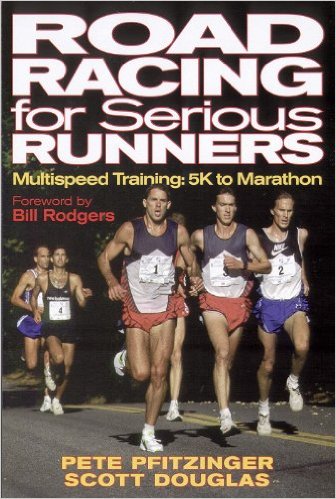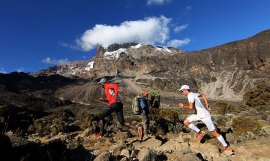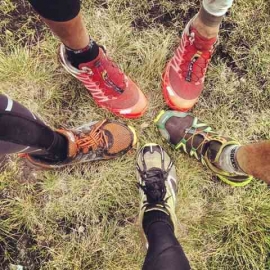Pete Pfitzinger 出版的书籍:
Advanced Marathoning_Pete Pfitzinger;Scott Douglas_2001|2008
//www.nduoke.com/shujibaike/shuji-0653
Faster Road Racing: 5K to Half Marathon_Pete Pfitzinger;Philip Latter_2014
//www.nduoke.com/shujibaike/shuji-0654
Road Racing for Serious Runners: Multispeed Training- 5K to Marathon_Pete Pfitzinger;Scott Douglas_1998
//www.nduoke.com/shujibaike/shuji-0655
《Road Racing for Serious Runners》简介:
Improve your racing performance through multispeed training! Whether your distance is 5K, marathon, or anything in-between, Road Racing for Serious Runners tells you how to train smarter and run faster. This training plan is based on solid science, and its physiological basis is clearly explained and incorporated into a running program that produces maximum results and reduces the risk of injury.
In Road Racing for Serious Runners, Pete Pfitzinger-a world-class marathoner, distance running coach, and exercise physiologist-tells you how to get the most out of your limited training time. Pfitzinger teams up with former Running Times editor-in-chief Scott Douglas to present a training
《Road Racing for Serious Runners》Review
""""Grounded in impeccable exercise science, this book nonetheless retains a warm, conversational tone that encourages runners of all levels of ability to keep reading beyond their specific areas of interest. The material is extremely well-organized, with charts, schedules, and checklists guiding the runner in organizing her or his training. Beyond just giving instructions, the book imparts knowledge and wisdom, teaching the performance-oriented runner to think rather than just do."""Gordon BakoulisEditor-in-ChiefRunning Times """This book provides an excellent, comprehensive look at training for competitive long-distance racing. Coaches and athletes can use this book as an outline to prepare for competitive racing. It helps remove guesswork since it contains information on all variables affecting successful racing-from human physiology to actual nuts and bolts workouts."""Mark Conover1988 Olympic Trials Marathon ChampionCross-country and Track Coach, California Polytechnic State University, San Luis Obispo "
""Grounded in impeccable exercise science, this book nonetheless retains a warm, conversational tone that encourages runners of all levels of ability to keep reading beyond their specific areas of interest. The material is extremely well-organized, with charts, schedules, and checklists guiding the runner in organizing her or his training. Beyond just giving instructions, the book imparts knowledge and wisdom, teaching the performance-oriented runner to think rather than just do.""
Gordon Bakoulis
Editor-in-Chief
Running Times
""This book provides an excellent, comprehensive look at training for competitive long-distance racing. Coaches and athletes can use this book as an outline to prepare for competitive racing. It helps remove guesswork since it contains information on all variables affecting successful racing-from human physiology to actual nuts and bolts workouts.""
Mark Conover
1988 Olympic Trials Marathon Champion
Cross-country and Track Coach, California Polytechnic State University, San Luis Obispo
"
From the Publisher
"This cutting-edge runner’s training resource is the most clearly written and detailed source of information on how to train smart that I’ve ever read. It contains the methods by which anyone can improve their running and racing."
Bill Rodgers Four-time winner, Boston and New York City Marathons
"Extremely well-organized, with charts, schedules, and checklists guiding the runner in organizing her or his training. Beyond just giving instructions, the book imparts knowledge and wisdom, teaching the performance-oriented runner to think rather than just do."
Gordon Bakoulis Editor-in-Chief Running Times
"An excellent, comprehensive look at training for competitive long-distance racing. It helps remove guesswork, since it contains information on all variables affecting successful racing—from human physiology to actual nuts and bolts workouts."
Mark Conover 1988 Olympic Trials Marathon Champion Cross-country and Track Coach, California Polytechnic State University, San Luis Obispo
About the Author
Pete Pfitzinger is a two-time member of the U.S. men's Olympic marathon team, a distance running coach, and an exercise physiologist. As a runner, he established himself as one of the best marathoners in U.S. history by outkicking Alberto Salazar to win the 1984 U.S. Olympic Marathon Trials. That same year he received the DeCelle award for being America's best distance runner and was named Road Runners' Club of America Runner of the Year. He is also a two-time winner of the San Francisco Marathon and finished third in the 1987 New York City Marathon. As a coach, Pfitzinger has more than 18 years' experience, including working with distance runners at the University of Massachusetts, University of New Hampshire, and Mount Holyoke College.
In his current position as an exercise physiologist, Pfitzinger specializes in working with endurance athletes. He is a contributing editor for Running Times, which features his monthly column, ""The Pfitzinger Lab Report."" His writing has also appeared in American Health, Runner's World, and New England Runner. A graduate of the University of Massachusetts with an MS in exercise science, Pfitzinger currently lives in Auckland, New Zealand.
Scott Douglas is a former editor-in-chief of Running Times, where he continues to work as a senior writer. He has published articles in Runner's World, Women's Sports & Fitness, and Road Race Management. He is also a former editor of Running & FitNews, a publication of the American Running and Fitness Association. Douglas has coauthored two books with Bill Rodgers-Bill Rodgers' Lifetime Running Plan and The Complete Idiot's Guide to Jogging and Running.
Douglas has been a competitive runner since 1979, setting personal bests of 30:48 in the 10K, 51:01 in the 10 mile, and 1:08:40 in the half-marathon. Running competitively for almost 20 years, he has kept in tune with runners who have to fit training and racing around the demands of a career. He is well-known in running circles for his former column inRunning Times, ""Scott Speaks,"" which focused on the concerns and cares of competitive runners. Douglas resides in Bethesda, MD.
"
《Road Racing for Serious Runners》亚马逊读者评论:
Pfitzinger's book finally delivers on what I always want from a book on a complex subject, simple explanations and simple solutions. Why write 800 pages when 188 will suffice. If you are only looking to train for 5K's then you can skip the section on 10K and marathon training and get even more concise explanations. This book gives short, simple explanations to the key elements of a training program. We now know everything we need to know about VO2 max and lactate threshold training, their relative importance, how to improve them and how to incorporate them into your training program. Pete indirectly points out how most of us are doing no lactate threshold training (by running most of our daily runs to slow) and doing all of our interval work to fast. I recommend this book to anyone looking to improve his or her racing times.
I would also suggest buying "Daniels Running Formula". I bought it last summer and my 5K's times went down from 19:40 to 18:50. I bought "Road Racing for Serious Runners" to basically get a second opinion on Daniel's theories. Actually these are not opinions or theories. These are time-tested methods back by sound science. I'm 43 years old and I'm living proof that random training will yield random results. Both Pfitzinger and Jack Daniels book will eliminate the "lets try this" approach to training. Both books cover the same topics and both authors come up with the basically the same training program. Daniels book breaks his schedule into 4 six-week phases while Pfitzinger has a 10-week and an 11 phase. When you look at both plans it becomes obvious and almost laughable on how easy it is to improve on your racing times (and in my case actually cut back on the training intensity).
I would buy both books so you can really feel good about your new training methods. Pete's book is simpler and has separate schedules for some of us low 20-40 mile per week folks. Daniels book has slightly more science and covers more topics. Daniels also has been around longer and has trained more athletes. There are only a few contradictions in Pete's book. He states on page 21 that your volume of Vo2 max workouts (your hard intervals) should be 1 workout per week with a total distance covered of 4 to 8K with the possibility of adding a second lower volume session each week. This corresponds with Daniels book where he has 2 Vo2 max sessions each week (or 1 Vo2 Max and a race). But when you get to the detailed 5K schedules for the 20-40 miles per week you only see 6 Vo2 max workouts scheduled in 21 weeks, despite them being listed as the number one priority. Also only 5 threshold workouts are scheduled in the last 11 weeks for the 20-40 mile schedule. I guess Pete is no dummy. He knows that Bill Rodgers may not use his book and that it will be geared towards people like me. He knows that I'm going to sneak in a combination of ten 5K and 8K races this fall before I attempt to peak in early December. The Daniels book just encourages it and has those realities clearly shown on the schedules. Just buy both books, start training smarter and in some cases a little easier. I've bought bad unhealthy lunches for [PRICE]. If you run this will be the best [PRICE} you will ever spend.
There are several good books available now that explain "state of the art" training for distance runners. Most of those books deal with concepts like VO2 max and lactate threshold and show the reader how to make use of those concepts in his or her training. This is the best book I've seen of that type. The concepts are explained clearly, and the author shows how to train effectively and efficiently using these and other key concepts. I felt like I understood a lot more about training when I finished the book, and rereading some sections has deepened my understanding. I especially like the fact that training schedules are easy to understand, reasonably flexible, and that schedules are provided for runners at different levels and for different distances, e.g. runners who do around 20 miles a week and want to train for a 5K. I remember watching the author win the 1984 Olympic marathon trials against many runners who arguably had more talent, and that credibility should give the reader confidence that good results will come if the schedules and principless are applied.




